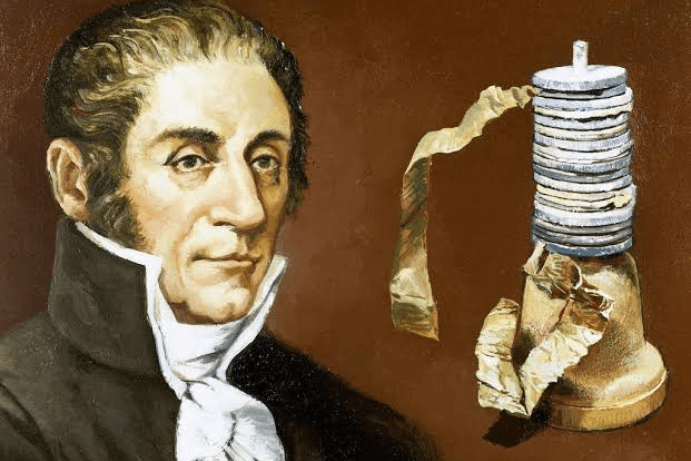On February 18, 1745, Alessandro Volta was born in the picturesque town of Como, Italy. The world knows only little about this man who would revolutionize science and pave the way for modern electricity. Today, we celebrate the life and achievements of this brilliant physicist whose discoveries continue to power our world—literally!
A Spark of Genius
Alessandro Volta was not born into a family of scientists or inventors. In fact, he showed an early passion for physics despite his family’s wish for him to pursue law. By the time he was in his twenties, he was already making waves in the scientific community with his fascination for electricity.
Volta’s first major work in 1775 was the invention of the electrophorus, a device that could generate static electricity. Though simple in design, this was a crucial step toward harnessing electrical energy, proving Volta’s deep understanding of the mysterious force that scientists were only beginning to grasp.
The Great Battery Breakthrough
Volta’s biggest contribution to science came 25 years after his first invention, electrophorus. In 1800, he developed the world’s first true battery the Voltaic Pile. This groundbreaking invention consisted of stacked zinc and copper plates separated by saltwater-soaked cloth. Unlike earlier electrical experiments that relied on friction, Volta’s battery provided a steady, continuous flow of electric current—something that had never been achieved before.
This discovery not only laid the foundation for electrical engineering but also disproved a competing theory by his scientific rival. Luigi Galvani believed that electricity in animal tissues was responsible for generating power (hence the term galvanism). Volta proved that electricity could be generated chemically without biological involvement. His inventions forever changed the way scientists understood electrical energy.
The Impact: Lighting Up the Future
Volta’s work caught the attention of none other than Napoleon Bonaparte. He was so impressed and invited Volta to demonstrate his findings in Paris. Napoleon even awarded him the title of Count in 1810, recognizing his contributions to science.
But Volta’s legacy went far beyond royal titles. His discoveries directly led to the development of modern batteries, electric circuits, and even the eventual rise of electrical engineering as a field. In his honor, the unit of electric potential, the volt (V), was named after him.
Life Beyond Science
Despite his revolutionary discoveries, Volta remained a humble and dedicated scientist. He retired in 1819 and spent the rest of his life in his hometown of Como, where he passed away in 1827 at the age of 82.
Volta’s contributions, however, live on and his major career accomplishments are
- 1775 – Invented the electrophorus, a device that generates static electricity.
- 1776-1778 – Discovered and isolated methane gas, recognizing its flammability.
- 1799-1800 – Invented the Voltaic Pile, the first true battery, enabling continuous electric current.
- 1800 – His battery disproved Luigi Galvani’s animal electricity theory, establishing electrochemistry.
- 1801 – Demonstrated his findings to Napoleon Bonaparte, earning the title of Count and the Legion of Honour.
- 1810 – Appointed as a Senator of the Kingdom of Italy by Napoleon.
- 1815 – Became the director of the Philosophical Faculty at the University of Pavia.
- 1881 – The unit of electric potential, the volt (V), was named in his honor.
Final Thoughts
Born on February 18, Alessandro Volta was more than just a scientist, he was a visionary. He turned the spark of curiosity into a revolution. His remarkable accomplishments continue to power our modern world. And his legacy reminds us that one discovery can change the course of history.
So, the next time you plug in your device, take a moment to appreciate the man who made it all possible—Alessandro Volta, the father of the battery!

